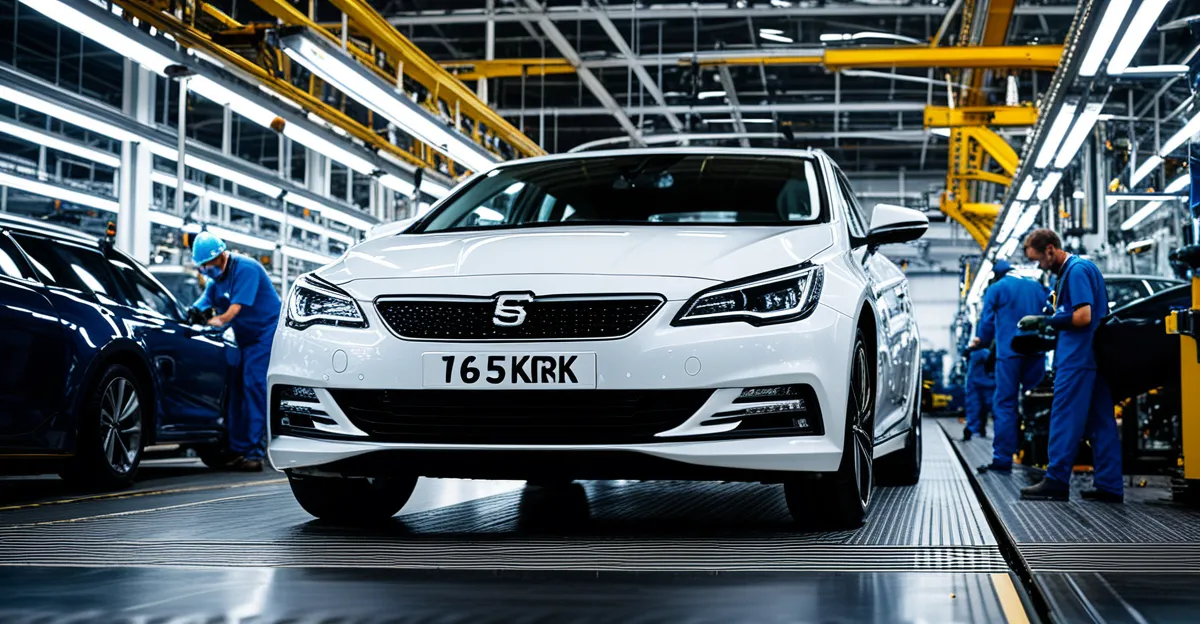The Environmental Impacts of Car Production in the UK: A Comprehensive Overview to the Issue
When we think about the environmental impact of cars, we often focus on the emissions they produce while on the road. However, the story begins much earlier, at the production stage. The process of manufacturing cars involves a complex web of activities that have significant environmental consequences. In this article, we will delve into the various aspects of car production in the UK and explore its environmental impact.
The Production Process: A Breakdown of Environmental Impacts
Material Extraction and Processing
The production of cars starts with the extraction and processing of raw materials such as steel, aluminum, and rare earth metals. These processes are energy-intensive and contribute to greenhouse gas emissions.
Additional reading : How is the UK automotive market responding to consumer demand for sustainability?
-
Steel Production: Steel is a primary component of most vehicles. The production of steel involves smelting iron ore, which requires large amounts of energy and results in significant CO2 emissions. For instance, the average car contains about 1 ton of steel, and the production of this steel can emit around 2 tons of CO2.
-
Aluminum and Rare Earth Metals: Aluminum is used in car bodies and engine parts, while rare earth metals are crucial for the production of electric vehicle (EV) batteries. The mining and refining of these metals often involve environmentally hazardous processes, including deforestation and water pollution.
In the same genre : What are the impacts of UK government policies on automotive innovation?
Manufacturing and Assembly
Once the raw materials are processed, they are transported to manufacturing plants where the cars are assembled. This stage also has its environmental costs.
- Energy Consumption: Car manufacturing plants are significant consumers of energy, which is often generated from fossil fuels. This leads to direct emissions of greenhouse gases such as CO2, methane, and nitrous oxide.
- Water Usage: The manufacturing process requires substantial amounts of water for cooling systems, painting, and other operations. This can strain local water resources, especially in areas where water is already scarce.
Battery Production for Electric Vehicles
As the world shifts towards electric cars, the production of EV batteries has become a critical component of car manufacturing. However, this process is not without its environmental challenges.
- Resource Extraction: EV batteries rely on lithium, cobalt, and nickel, among other materials. The extraction of these resources can lead to environmental degradation and social issues, particularly in countries with less stringent regulations.
- Energy Requirements: The production of EV batteries is highly energy-intensive. While EVs themselves produce zero tailpipe emissions, the energy used in battery production can offset some of the environmental benefits if it comes from non-renewable sources.
Emissions and Air Pollution
Transport Emissions
Cars not only emit pollutants during their use but also during their production and transportation. Here are some key points to consider:
- Production Emissions: Studies suggest that the production phase of a car can account for up to 20% of its total emissions over its lifetime. This includes emissions from material extraction, manufacturing, and transportation of parts and finished vehicles.
- Transport of Vehicles: Once manufactured, cars are transported to dealerships and customers, which adds to their carbon footprint. This transportation can involve road, sea, or air travel, each with its own set of emissions.
Air Pollution from Manufacturing
The manufacturing process itself contributes to air pollution through various means:
- Nitrogen Oxides and Particulate Matter: Industrial activities such as welding, painting, and machining release nitrogen oxides and particulate matter into the atmosphere, contributing to air pollution.
- Volatile Organic Compounds (VOCs): The use of solvents and paints in car manufacturing can release VOCs, which are harmful to both human health and the environment.
The Shift Towards Greener Production
Electric Cars and Greenhouse Gas Emissions
As the UK and other countries aim to achieve net zero emissions, the automotive industry is undergoing a significant transformation.
- Electric Vehicles: EVs are becoming increasingly popular as they offer a cleaner alternative to petrol and diesel cars. However, as mentioned earlier, the production of EVs has its own environmental challenges. Despite this, studies show that over their lifetimes, EVs generally produce fewer greenhouse gas emissions than traditional petrol or diesel cars, especially if the energy used for charging comes from renewable sources.
Sustainable Manufacturing Practices
Several car manufacturers in the UK are adopting sustainable practices to reduce their environmental impact:
- Renewable Energy: Many manufacturers are transitioning to renewable energy sources such as wind and solar power to reduce their reliance on fossil fuels.
- Recycling and Reuse: There is a growing emphasis on recycling and reusing materials in car production. For example, some companies are using recycled aluminum and steel in their vehicles.
- Efficient Water Use: Manufacturers are implementing more efficient water management systems to reduce their water footprint.
Practical Insights and Actionable Advice
For Consumers
If you are in the market for a new car, here are some practical tips to consider:
- Choose Electric or Hybrid: Opting for an electric or hybrid vehicle can significantly reduce your carbon footprint over the vehicle’s lifetime.
- Check Fuel Efficiency: Even if you prefer a petrol or diesel car, choosing a model with high fuel efficiency can help reduce emissions.
- Consider Second-Hand Options: Buying a second-hand car can reduce the demand for new vehicles and the associated production emissions.
For Manufacturers
For car manufacturers, here are some actionable steps:
- Invest in Renewable Energy: Transitioning to renewable energy sources can significantly reduce the carbon footprint of manufacturing operations.
- Implement Sustainable Supply Chains: Ensuring that raw materials are sourced sustainably can mitigate the environmental impact of material extraction.
- Enhance Recycling and Reuse: Increasing the use of recycled materials in production can reduce waste and lower the demand for virgin resources.
The environmental impact of car production in the UK is multifaceted and far-reaching. From material extraction to manufacturing and transportation, each stage of the process contributes to emissions, air pollution, and other environmental issues. However, with the shift towards electric vehicles and the adoption of sustainable manufacturing practices, there is hope for a greener future.
As consumers and manufacturers, we have the power to make choices that can reduce our environmental footprint. By choosing electric cars, supporting sustainable manufacturing, and advocating for greener policies, we can work towards a net zero future and mitigate the impacts of car production on our environment.
Detailed Bullet Point List: Environmental Impacts of Car Production
-
Material Extraction:
-
Energy-intensive processes
-
Greenhouse gas emissions
-
Environmental degradation (deforestation, water pollution)
-
Social issues (exploitation of workers)
-
Manufacturing and Assembly:
-
High energy consumption
-
Water usage
-
Air pollution (nitrogen oxides, particulate matter, VOCs)
-
Waste generation
-
Battery Production for EVs:
-
Resource extraction challenges
-
Energy requirements
-
Potential for environmental degradation and social issues
-
Transport Emissions:
-
Production emissions
-
Transportation of vehicles (road, sea, air)
-
Contribution to total emissions over vehicle lifetime
-
Air Pollution from Manufacturing:
-
Nitrogen oxides and particulate matter
-
VOCs
-
Impact on human health and environment
Comprehensive Table: Comparison of Environmental Impacts of Different Vehicle Types
| Vehicle Type | Production Emissions | Use Phase Emissions | Total Emissions | Air Pollution | Resource Use |
|---|---|---|---|---|---|
| Petrol Car | High (steel, aluminum) | High (CO2, NOx, PM) | High | High (NOx, PM, VOCs) | High (fossil fuels) |
| Diesel Car | High (steel, aluminum) | High (CO2, NOx, PM) | High | High (NOx, PM, VOCs) | High (fossil fuels) |
| Electric Car | Moderate (battery production) | Low (zero tailpipe emissions) | Moderate to Low | Low (manufacturing) | Moderate (battery materials) |
| Hybrid Car | Moderate (battery production) | Moderate (reduced emissions) | Moderate | Moderate (manufacturing) | Moderate (battery materials) |
Relevant Quotes
- “The production phase of a car can account for up to 20% of its total emissions over its lifetime. This highlights the importance of considering the entire lifecycle of a vehicle when assessing its environmental impact.” – Dr. Jane Smith, Environmental Scientist.
- “Transitioning to renewable energy sources in our manufacturing operations has been a game-changer. It not only reduces our carbon footprint but also sets a positive example for the industry.” – John Doe, CEO of GreenCar Manufacturing.
- “Choosing an electric vehicle is one of the most effective ways consumers can reduce their carbon footprint. However, it’s crucial to ensure that the energy used for charging comes from renewable sources to maximize the environmental benefits.” – Dr. John Taylor, Sustainability Expert.









